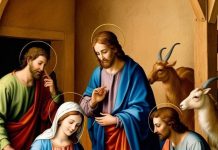It is rather an unusual title for an article posted at the beginning of the lent. End is more important than beginning. Even while admitting that ‘ the end does not justify the means’ we should bear in our mind that ‘all’s well that ends well’. End is more important than the beginning as well as the means we employ to reach the end, with the caveat that the means should be those permitted by God.
We are entering Lent and it is all about fasting and praying. Is Lent an end or means to an end? By all means, it is a means to reach a higher goal. To know what the goal is, we should check with those who subjected themselves to the rigours of fasting. Let us start with Jesus who was in the wilderness for forty days. It was no ordinary fasting. Look how the gospel describes it; ‘Jesus, full of Holy Spirit, returned from the Jordan and was led by the Spirit in the wilderness, where for forty days he was tempted by the devil. He ate nothing at all during those days, and when they were over, he was famished’ (Lk 4: 1-2).
We do fast during Lent. But most of us reach nowhere near how Jesus fasted. Some of us refrain from taking food one time every day. Some avoid two meals a day. And some,very rarely, following Jesus in the true way, abstain from all food for the entire period of Lent. Though fasting is limited to food, in a broader sense abstinence from anything which used to give us pleasure supplements our efforts. Whatever be the type of fasting,our intention is to reach the end where Lent should take us.
Now what is the purpose of fasting and praying? Jesus used those forty days of fast and prayer as a diving board to commence his mission. We read that immediately after the temptation in the wilderness, Jesus returned to Galilee to begin his preaching with the simple words; “Repent, for the kingdom of heaven has come near” (Mt 4:17).
Often we think that the tempter was patiently waiting for forty days to approach Jesus and once that period was over pounced on him and offered humanly irresistible temptations to distract him from the holy mission of preaching the gospel. No. Luke says that he was tempted for forty days. In Mark’s words, ‘he was in the wilderness forty days, tempted by Satan’ (Mk 1:12). Perhaps Satan was present there well before Jesus reached the wilderness. The tempter was determined to block the spread of the gospel, because he knew that those who listen to the gospel and live accordingly will be saved, which is the last thing he would like.
Lesson one. Be prepared to meet the tempter anywhere in your journey through this Lent. It can be in the beginning, midway or in the final moments when we feel a sense of certain triumph in our hearts. Do not be self assured till the very last moment. Because the tempter knows the most appropriate time and situation to trap us. Those three temptations we read in the gospels were the culmination of a series of temptations – big and small – that he offered Jesus. In fact many people testify that the most crucial period of fasting is the first few days. It is the most difficult to overcome. Once this period is over, things become easier, though fasting need not be a smooth sail even after that.
How did Jesus face all those temptations for forty days on end? Or what was the driving force that made him stand against those seemingly irresistible offers? Naturally we would be inclined to think that it was his fast and prayer that helped him to ward off temptations. That is only part of the story. Major reason lies somewhere else. Let us go back to Luke’s narration of the temptation. There, we read that ‘Jesus, full of the Holy Spirit, returned from Jordan’. This is the most important single factor that contributed to the success of Jesus’ fast and prayer. He commenced the arduous journey that lasted forty days, keeping sufficient fuel in the vehicle. He was burning with the fire of Holy Spirit, the eternal source of non perishable energy.
Lesson two. If you are serious about reaping any benefit out of this Lenten fast, start it with the help of the Holy Spirit. Elsewhere Jesus said that we cannot do anything without Him. It is the Spirit that gives life; flesh is useless. We live in flesh and we cannot combat flesh with flesh. Only thing capable of conquering the flesh is the power of Holy Spirit. ‘The spirit indeed is willing, but the flesh is weak’ (Mt 26:41). With this weak flesh, we need the power of Holy Spirit to win this race.
Jesus commenced his journey full of the Holy Spirit, then faced those three major temptations and came out triumphant. Many Christians think that the Holy Spirit dropped Jesus in the wilderness to be tempted by Satan for forty days and after the appointed time, came back and took him to Galilee. But the Scripture gives a different picture. Luke says that ‘for the next forty days he was led by the Spirit in the wilderness’. It was the Holy Spirit who was leading Jesus in every step and at every moment during those forty days. Jesus started with the Holy Spirit and he persevered with the help of the Holy Spirit. Victory was but a foregone conclusion.
Lesson three. Always ask for the help of the Holy Spirit. It is foolish to think that we can come out successful at the end of this Lent with our own power. If we have the Holy Spirit working with us and within us, the evil one will not touch us.
Prayer with fasting is something dear to God. That is why, Moses did it for forty days to make him worthy to receive the tablets containing ten commandments. ‘When I went up the mountain to receive the stone tablets, the tablets of the covenant that the Lord made with you, I remained on the mountain forty days and forty nights; I neither ate bread nor drank water’ (Deut.9:9). When Moses returned to his people with the tablets, what awaited him was a golden calf and an entire population dancing around it. ‘So he took hold of the two tablets and flung them from his two hands, smashing them before the eyes of the Israelites’ (Deut 9:17).
Lesson four. As long as you live a secluded life and continue fasting and prayer, you need not worry about anything. But when you return to your family, your congregation, your church, your society, your neighborhood, never expect that you will get a warm welcome. The reason is simple. You only fasted and you only prayed. All others whom you are going to meet are those very same people. They have not fasted, they have not prayed. And they have no issue in exchanging the glory of their God with a worthless idol. So at the end of any fasting prayer, it is wise to expect the unexpected.
Normally forty days of fasting was adequate. But for Moses, everything had to be repeated, this time as penance for the sins of his people. ‘Throughout the forty days and forty nights that I lay prostrate before the Lord when the Lord intended to destroy you, I prayed to the Lord and said, “Lord God, do not destroy the people who are your very own possession, whom you redeemed in your greatness, whom you brought out of Egypt with a mighty hand” (Deut 9:25-26.) At the end of this second fasting, God again gave him the commandments written on two tablets.
Lesson five. Fasting is not for you alone. It is equally beneficial for others. In fact, it is one of the surest ways to do penance and reparation for the sins of your loved ones, and society at large. We have the example of Nineve, where the king and his nobles led the people of the city in fasting and praying. As a result, ‘God changed his mind about the calamities that he had said he would bring upon then; and did not do it’ (Jon 3:10). If there are sufficient people in a place ready to prostrate before the Lord, that place will be saved.
When the devil realized that he could not trap Jesus into temptations, he simply left the place, or we think so. In fact the gospel tells us that ‘the devil departed from Jesus until an opportune time’. Perseverance is a virtue of the devil too. He will wait any long and he will employ any weapon in his quiver to pluck a soul from Lord’s garden. Even while you think that you have conquered a temptation, be on your guard. Your enemy is scheming another trap for you. He will lay it at the opportune time, and if you are not vigilant enough, you might end up in his net.
Lesson six. Never underestimate the power of evil. He will pounce on us at the most opportune time, when we are weak, when we are not vigilant, when we are given to dissipation and drunkenness. If he laid in wait to trap even Jesus at an opportune time, he will attack us also.
Now we are coming to the most important question. What did Jesus benefit from his forty days of fast and prayer? What did he gain by steadfastly standing up to the vile advances of his rival? Or what did he do after coming out of the wilderness?
‘Then Jesus, filled with the power of the Spirit, returned to Galilee, and a report about him spread through all the surrounding country. He began to teach in their synagogues and was praised by everyone’ (Lk 4:14-15). Those forty days of fasting and prayer saw Jesus strengthened in Spirit. We do not know exactly how a report about Jesus spread through all the country. But we know one thing, that the news about a person who is filled with the power of Holy Spirit will spread like wildfire. This is a mystery of the Holy Spirit. Like the fragrance of a flower permeating its surroundings, the fire of the Holy Spirit in us will be manifested in a mysterious way so as to be visible to those around us. Jesus, filled with the power of the Spirit immediately began to teach. He commenced his preaching with a few simple words; “Repent, for the kingdom of heaven has come near” (Mt 4:17).
Lesson seven. The most important benefit of the twin remedies of prayer and fasting applied together is that we will be filled with the power of the Holy Spirit at its end. This power of the Spirit should be channelled to proclaim the good news to others. This is essentially what God expects from us. I am not denying the other benefits of fasting. You may be able to come out of some evils or bad habits. You may be better disposed physically after fasting. You might even get slimmer after a prolonged fasting. But remember; we are not talking about a fasting for physical healing or weight loss. If these are your primary goals at the time of fasting, I have nothing to say except what Paul said to Corinthians; “If for this life only we have hoped in Christ, we are of all people most to be pitied” ( 1 Cor. 15:19).
Dear brothers and sisters in Christ, fasting is a spiritual weapon for us. The end of Lent should bring out the reinvigorated Christian in each one of us. We are undertaking this Lenten fasting not for breaking it at Easter Vigil. Rather it should cultivate in us a fervent desire to proclaim that our Lord has risen. This is possible only when we are filled with the power of the Holy Spirit.
Come, let us join the millions of Christians across the world, who approach this coming Lent with a contrite heart. Be mindful of the words of Isaiah. “Is such the fast that I choose, a day to humble oneself? Is it to bow down the head like a bulrush, and to lie in sackcloth and ashes?” (Isa 58:5). It is a warning to those who perform all those exterior requirements of fasting but remain rebellious in their hearts. True fast is something else. ‘ Is not this the fast I choose: to loose the bonds of injustice, to undo the thongs of the yoke, to let the oppressed go free, and to break every yoke? Is it not to share your bread with the hungry and bring the homeless poor into your house; when you see the naked, to cover them, and not to hide yourself from your own kin?” (Isa.58:6-7)
Come, let us dedicate this Lenten fast for the sanctification of self and others, as penance for our sins as also that of others and to prevent the hand of God from falling upon us. Above all, begin this Lent with the full power of Holy Spirit as Jesus did. Receiving the Holy Eucharist after a good confession is the best thing we can do on the first day of Lent. Sacraments are the channels through which we receive the graces of the Holy Spirit.
Go through every moment of these blessed days with the help of the Holy Spirit. Stand up to the temptations of the devil and come out victorious, fully charged to proclaim the gospel to the world. May the spirit of penance, sacrifice and reparation be the hallmarks of this Lent. We do not know whether we will get another Lent to repent and return. And we do not know how much time is left for us to take the gospel to the whole world, which is one of the conditions our Lord has given us to be fulfilled before his glorious second coming.

















